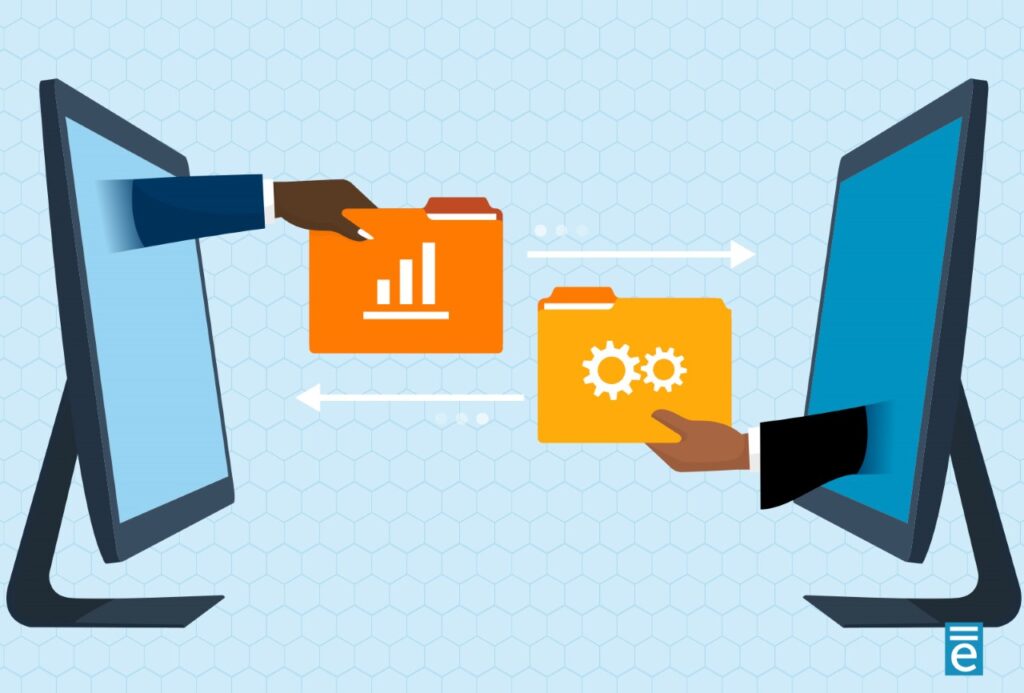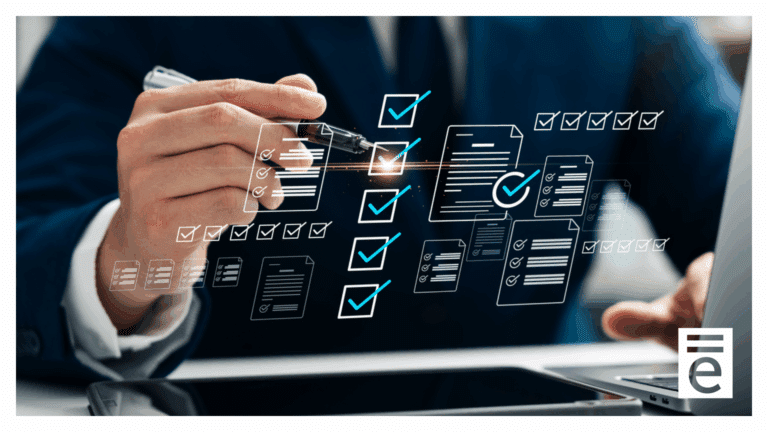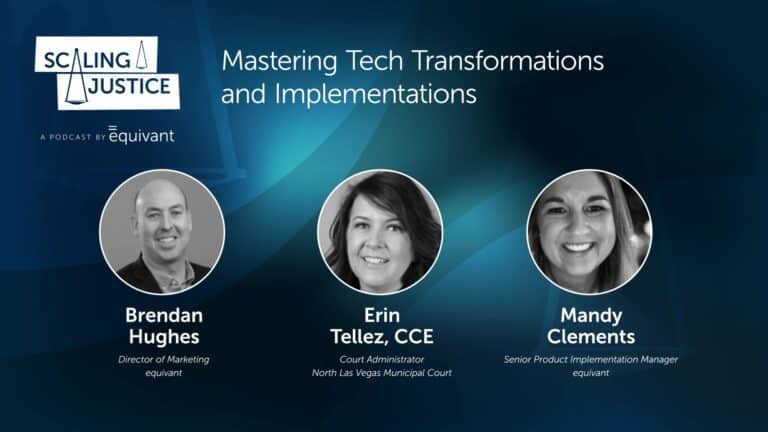Setting up secure data exchange between courts and other agencies can be a breeze, especially when courts embrace the process.
By Patricia Jacoby, Director of Development for Court Products
As equivant’s past general manager, Becky Kelderhouse said, “Data ties the whole justice machine together.” In other words, the processes that keep communities safe and justice working efficiently—like issuing parking tickets, moving court cases along and reporting their outcomes, and managing inmates’ custody status and probations—all generate data and require it to be shared.
So, it’s a no-brainer that courts and their partners—from prosecutor and sheriff’s offices to highway patrol and correctional facilities to child welfare and juvenile justice department to state supreme courts—should prioritize ensuring they can securely, automatically, and continuously exchange data with each other. At equivant, we’ve seen the number of requests for court management systems (CMS) that interface easily and smoothly with other software grow by leaps and bounds over the past decade. Courts are recognizing that sharing data makes it easier for them to do their jobs and advance justice.
Creating the technology behind data exchange is not difficult—and equivant’s got it covered! What is tough is that every U.S. county, court, and state does things just a little differently when it comes to categorizing and coding data. Even your neighboring counties may not use the same codes and define data the same way you do. Third-party software vendors often use yet another set of codes. That means the data you’re sending to other folks may start out looking different than theirs and vice versa.
The decentralization of the U.S. court system also means that while equivant offers a standard set of data-sharing interfaces called IJIS Broker/Integrator, we also know there’s really no such thing as a standard data-sharing interface. For most courts, the best solution must be customized.
The 3 Reasons to Get Excited About Data Sharing
Now, I know tech functions can seem boring to a lot of non-tech staff. So, here are three reasons to get excited about setting up data sharing with a partner agency:
1. Your staff and community will reap the benefits of efficient, accurate public service.
When courts and their partner agencies share data, they unify the information they have on individuals and anything related to law enforcement in their state. Sharing data provides continuity and increases efficiency and accuracy because your court doesn’t have to replicate data manually like everyone did in the Old Days!
IJIS Broker/Integrator is like a universal adaptor for data systems. No matter what language your system or others are using, it works seamlessly across environments to ensure users on all ends have the data they need.
The public also benefits because justice moves more smoothly. For example, when someone pays a parking ticket, the court and parking enforcement know about it automatically. And that person won’t get mistakenly fined or arrested for not paying the ticket.
Even more important are the impacts on justice-involved children and families. Data sharing between courts and child welfare agencies eases the administrative burden on them during proceedings and helps child welfare professionals act more quickly to protect vulnerable children. Statewide juvenile justice data exchanges, like Georgia’s, aim to inform legal advocates and judges and improve justice for young people.
To access these data-sharing benefits more efficiently, you need a CMS that’s built for integration. Research and consulting firm Gartner’s recent market guide for court case management systems strongly recommends courts consider CMS that prioritizes workflow, can be configured, and integrates with other systems.
equivant’s JWorks CMS meets these high thresholds because we build it on workflow processes and make it highly configurable. We’re a leader in system integrations, and our technology supports National Center for State Courts’ National Open Data Standards.
2. The more involved you are, the smoother setting up data sharing will go—and the closer the final product will be to your vision of a seamless system.
equivant has worked with many customers to set up data sharing with their partner agencies. Developing the perfect interface requires the deep involvement of court staff who use the CMS every day.
No, you can’t just leave it up to your IT staff and your partner’s vendor to work with us! We need your full attention. We insist the court be a part of discovery sessions to determine what the interface will do, how it will work, and how we’ll map data from one system to another.
Even better is when courts actively want to participate in the process. The end result: less guesswork for us, fewer unanticipated tasks during the development of the interface, and greater likelihood that courts will meet their budgets and deadlines and get a product that is exactly what they want and need.
One of our state clients has set up weekly calls with us — they’re very invested in their data exchange interfaces, and they have quite a few! But not every court needs to be quite as in the weeds. Even a little involvement can go a long way. When enthusiastic court staff take the time to share their input and mediate relationships among vendors and their partner agencies, the process becomes collaborative, positive, and seamless.
3. You don’t have to be a tech genius to help us set up your data exchange interface.
Don’t know XML from JAVA from Greek? That’s OK. What we need is your knowledge of how your court works—and you’re the expert on that.
Here’s what to expect from working with us on a data exchange project: We kick things off by meeting with both parties (the court and its partner agency) to understand what they’re looking for. Then, the two tech sides exchange API definitions, or how their software programs will communicate, and the court and its partner specify what data they want to exchange.
Then we get to work! Once we’ve developed the interface and done end-to-end testing, you and your staff (the users of the IT systems) will do what we call “user acceptance testing,” or UAT. The more involved you’ve been upfront, the more smoothly UAT goes. And when UAT goes according to plan, there’s less recoding and retesting. You get your new data exchange up and running quickly and easily.
At equivant, we understand no two counties or courts are the same. We’re always willing to customize our data-sharing interface if that works best for your court. We’d love to talk to you—and your IT team—about your needs and the nitty gritty data exchange standards our products meet. Please get in touch!
Quick Facts About equivant’s IJIS Broker/Integrator
It prioritizes your business processes. Your processes drive the data exchange, not the other way around.
Your partners maintain their own business processes. Every party to the information exchange retains their own processes and supports their own business requirements.
It captures information once. No duplication, no repetition. Information is captured at the point of origin and reused throughout the system.
Security is everything. Integration capabilities prioritize privacy and data security in all transactions and transports.
It supports disparate systems. Supporting web services, XML, and other open standards, the architecture is not dependent upon one specific technology or platform.
Data translation is robust and instantaneous. The data translation engine renders data elements to values that any exchange partners and systems can understand and consume.
It monitors and tracks transactions. The system supports ad hoc or scheduled, synchronous or asynchronous, and quick or long-running transactions, and it monitors and tracks the progress of each one through its lifecycle.
It’s JAVA-based. You’ll need a way to host the application, and that’s the only third-party software you’ll need to support the broker/integrator.
About Patricia Jacoby
Ms. Jacoby has more than 29 years of professional experience in software development. She has managed the business analyst staff, the development staff, and the quality assurance staff for the entire equivant product line.





